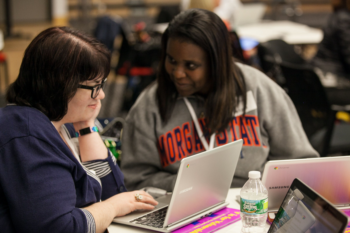Washer and Dryer Dilemma
 Washer and Dryer Dilemma
Washer and Dryer Dilemma
by P J Caposey, Guest Blogger
I often use this question when speaking to educators, but it applies (perhaps even more directly) to parents as well.
At what age should children start doing their own laundry?
I would argue that the earliest a child could start doing their own laundry is as soon as they can read and safely reach all of the appropriate buttons, soaps, and other necessary components to running a washer and dryer. I assert that a child should start doing their own laundry commensurate with the skills and lessons you are intending to teach them. Context matters.
I usually make this argument after giving the audience a minute to ponder the question and interact with their neighbors. While I think my persuasive skills are above average it does not take a lot of persuading to have people agree with my opinion. To be clear, my opinion is basically that most kids could be doing their own laundry somewhere in the neighborhood of seven-years-old based on reading, reaching, and lifting responsibilities.
What About Age Seven?
The next question is one you might expect. “So, how many of you had your children start doing their own laundry at the age of seven or plan to have your future children start doing laundry at that age?” To this question, very few hands go up.
This is where my education presentation goes in one direction and this blog will go in another.
What About a Teenager?
Let’s fast forward to this laundry example of seven years and you are now living in a house with the scariest creature on earth: a teenager. The teenager has all the stereotypical tendencies of that age group. In particular, laundry piles up in their room and often does not make it to the laundry room (where you still do all the work) until the weekend when you forcefully remind them.
Then, over the weekend when you want to be spending time with your spouse, working on a hobby or side project, or just relaxing, you are doing load after load of your child’s laundry. This activity does not bring you joy. In fact, it does the opposite. It stresses you out. You place the frustration of your ‘ruined’ weekend back on to your teenager who is oblivious to your angst since they are glued to a device and have headphones in their ears.
This is simply a manifestation of the problem we, as parents, created years before. The problem is that if, as parents, we can cognitively know that our children are capable of completing a task that many of us complain about doing ourselves, but refuse to allow them the opportunity to try we have nobody to blame but ourselves.
Instead, what typically occurs is that we bemoan our children’s lack of responsibility, resilience, or ambition. Meanwhile, we do little to promote, encourage, or teach the very thing we criticize them for not having.
Give Kids More Ownership
Thus, as a parent I think we need to look in the mirror and take some responsibility. We need to give our kids more ownership if we want them to be more responsible. We need to give our kids more opportunities to fail if we want them to become more resilient. We need to give our kids more legitimate opportunities to find individual success if we want them to become more ambitious.
This extended example of cognitive dissonance is to me shockingly metaphorical for the entire experience of parenting.
The very things that make parenting so hard and children, at times, so frustrating are often rooted directly in what we are or are not doing as parents. We often lack the time, effort, and energy to provide authentic learning opportunities for our kids, but they exist all around us. The laundry example is just the tip of the iceberg. The problem is not just that we are not giving our kids these opportunities, but then we blame them for their lack of individual growth.
Life Is a Learning Experience
I know all of the arguments specifically about the washer and dryer and they tend to extend to any other opportunity we choose or do not choose to give to our children. The long and short of it is that any time we choose to use ‘life’ as a learning experience for our children there is a give and take.
We choose expediency over opportunity. Teaching takes time. It will undoubtedly take you longer to teach your children how to do the laundry than it would to just do it yourself. The question is whether you are going to pay that short term debt for the long-term gift of time and more importantly the responsibility you teach your children.
Let Go of Control
We choose money over moments. Your kid is going to ruin some clothes if they are doing their own laundry. It will cost you more money than if you did it yourself at first. Thus, the question is whether the cost of ensuring you do not waste any money is worth the time you could have spent laughing at their pink undershirts and helping them learn?
We choose control over (perceived) chaos. The truth is that very little of what we can allow students to have responsibility for is actually dangerous with the appropriate teaching. Instead, the uncertainty of what will happen when we are not the person in control of the idea, process, and outcome pushes us away from giving the very experiences which will teach the lessons we most want our kids to learn.
Parenting is the hardest job I have ever had, but it is also similar to every job I have ever had. If as a leader, which as parents we are, we expect performance we have to provide the training and support necessary to help our children have success. If we fail to provide the training and support during times of failure and success, we have nobody to blame but ourselves when their behaviors do not meet our expectations.
P J Caposey’s Biography
PJ Caposey is a dynamic speaker and a transformational leader and educator. PJ began his career as an award-winning teacher in the inner-city of Chicago and has subsequently led significant change in every administrative post he has held. PJ became a principal at the age of 28 and within three years was able to lead a small-town/rural school historically achieving near the bottom of its county to multiple national recognitions. After four years, PJ moved to his current district, Meridian CUSD 223, as superintendent and has led a similar turnaround leading to multiple national recognitions for multiple different efforts.
PJ is a best-selling author and has written eight books for various publishers. His work and commentary have been featured on sites such as the Washington Post, NPR, CBS This Morning, ASCD, Edutopia, the Huffington Post, and was featured in a Global Leaders Forum thinkpiece alongside the likes of General Petraeus and General McChrystal. He works in the Education Department of two universities and in a myriad of capacities with the Illinois Principal’s Association including Principal Coach and author of the first complete stack of MicroCredentials offered in Illinois.
You can find him on most social media platforms with the handle @MCUSDSupe or his name PJ Caposey. His website www.pjcaposey.com also archives many speeches, blogs, podcasts, and articles for your review.
 Purposeful Parenting and Overcoming Challenges
Purposeful Parenting and Overcoming Challenges Embrace and Learn from Mistakes and Challenges
Embrace and Learn from Mistakes and Challenges Purposeful Parenting Pointers
Purposeful Parenting Pointers Managing Daily Family Life
Managing Daily Family Life